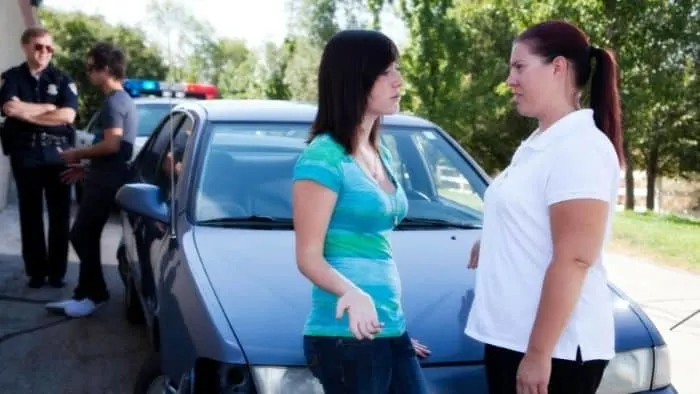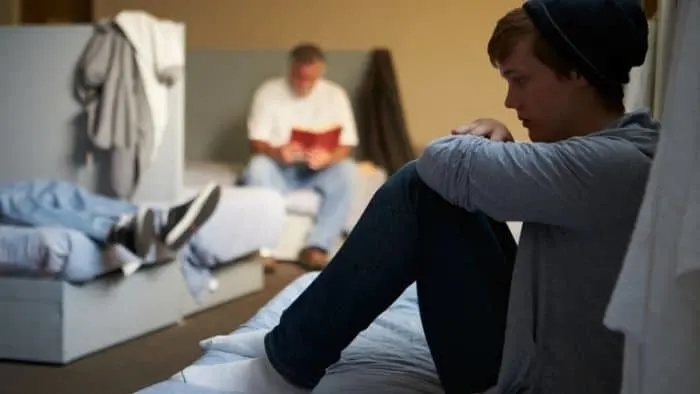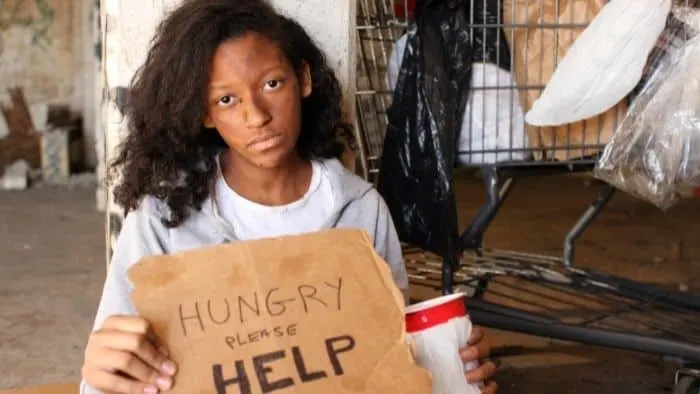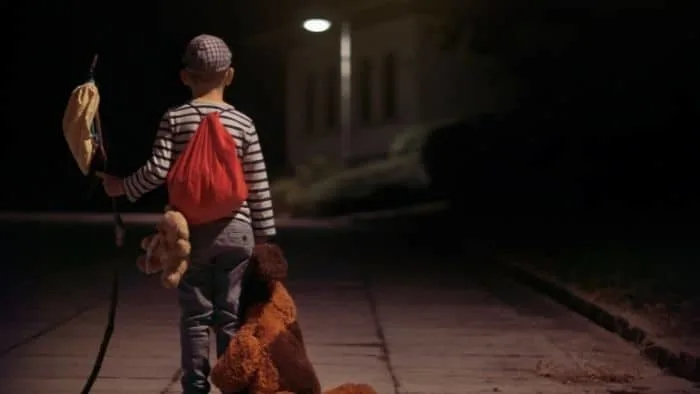According to the National Runway Safeline, between 1.6 million and 2.8 million kids run away from home every year.
If you run away from home at 16 your parents must notify the police, who will add your name to the NCIC. Running away is not illegal, so you won’t be arrested. Police can either take you home, get permission from your parents to let you stay with friends or family, take you to a shelter or briefly keep you in custody.
Let’s talk about what happens when a teenager runs away from home and answer common questions about runaway laws.
What Happens If You Run Away From Home At 16?
A runaway is a child under the age of 18 who stays away from home overnight without a guardian’s or parent’s approval.
Running away from home comes with several negative consequences for minors:
- Running away from home decreases the likelihood of graduating high school.
- Runaways have to fend for themselves if they don’t have family, friends, or relatives to provide food and shelter when they run away.
- There is a very high risk of being exploited by unscrupulous people as you have no one to protect them in dangerous situations.
- To survive on your own, you will have to work. The problem is most employers will not hire minors. The difficulty in finding ways to make a living will push you to depend on strangers’ generosity or engage in risky activities such as selling drugs.
Remember, authorities take a runaway child into custody in some states until they can return home or find a place to live.
🤓 Suggested reading: Can A 13 Year Old Have A Debit Card?
Is It Illegal To Run Away?

In many states, running away is isn’t illegal, but several states deem it a status offense.
A status offense is an illegal act solely because the person is a minor. You won’t be arrested, but police can take you into custody or ‘interim care’ to decide if you should go home or try and find a safe place for you to go to.
The main reason why running away isn’t considered a criminal offense in most states is that a significant number of minors run away because of valid reasons:
- Parents’ or teens’ drug and alcohol abuse
- Physical, emotional, sexual, and verbal abuse
- Problems arising from a minor’s sexual orientation
- Suicidal thoughts
- Mental health disorders or medical issues
- Family issues such as remarriages and divorce
- Mistreatment in foster care
As you can see, there are several genuine reasons why a teenager could run away from home and seek comfort elsewhere. It seems safer for them to run away than stay with their parents in these situations. Unfortunately, the streets are most likely not safe either.
In most states, it’s not a crime if a teen runs away from home. On the other hand, states that consider running away from home a status offense can place the runaway youth in temporary custody, or return them to their parents if safe to do so.
Note that “habitual runaways” (children who repeatedly attempt to run away) can face punishments such as suspended driving licenses, fines, and mandatory drug screening.
If I Run Away, What Can The Police Do?
Teens who run away from home usually find it difficult to survive on the streets. If they ran away from home because of issues like sexual abuse, they are not obligated to go back home.
In states where running away from home is considered a status offense, juvenile runaways are usually taken into custody or ‘interim care.’
Once in police custody, the runaways can be taken to a runaways’ shelter, held at a juvenile detention facility, or returned home.
In some cases, the police ask the parents or guardians to allow the runaways to stay with relatives or family friends for a short period.
Parents and guardians are required to report a juvenile runaway to the police as soon as possible. The police will put the kid’s description and name in the National Crime Information Computer (NCIC).
Remember, the police wouldn’t know why a teen ran away. If it’s because of issues like physical abuse, the minors must tell the police to avoid being returned home. The police will then refer the case to a child welfare agency to commence investigations and find emergency shelter for the minor.
For a detailed portrait of youth homelessness, you should read “Almost Home: Helping Kids Move from Homelessness to Hope” by Kevin Ryan.
The book gives a look into the lives of runaways and gives their stories a very relatable and real quality.
🤓 Suggested reading: Can A Police Officer Question A Minor Without Parental Consent?
Can A 16 Year Old Refuse To Come Home?
Some teens think of running away from home because they don’t like their parents’ strictness or think other teens have it easier.
However, some teenagers have valid reasons why they run away from home, for instance, if a child is fleeing an abusive situation at home.
In some states, once it has been established that a teen had a reasonable cause for leaving home, they will be placed with a family member, a family friend, in foster care, or a youth group home.
When a teen runs away from home, it is vital that they tell a trusted adult about their predicament, who will then get in touch with relevant authorities.
If the teen has no one to talk to, they can always call 1-800-RUNAWAY and get help. If it is established that going back home isn’t safe for them, child protective services will help them find a new place to live.
What States Have Runaway Laws?
Different states have different child runaway laws. In most states, minors leaving their homes is not a crime. In Wyoming, West Virginia, Utah, Texas, South Carolina, Nebraska, Kentucky, Idaho, and Georgia, leaving home without parental consent is considered a status offense like underage alcohol drinking.
How to Run Away From Home

Many teenagers contemplate running away from home, mainly after conflict with their parents. Leaving home and enjoying the freedom out there alone can seem great, but it’s usually not the case.
If you’ve thought about running away after disagreeing with your parents, give yourself some time for the anger to go away instead of making a hasty decision that you’ll regret.
However, some teenagers have genuine reasons for leaving their homes, for instance, those who are repeatedly abused by their parents.
So, before running away, think of whether the problem you have with your parents is a serious one.
If you feel that your household is unsafe, try to talk to a trusted adult: a school counselor, an aunt, or even a friend’s parent. You can also call Child Protective Services (CPS) for help.
You can file a ‘Complaint for Protection from Abuse” against a person abusing you.
If you have decided to run away, find a safe place to stay in. It could be at a relative’s home or a family friend’s.
Call 1-800-786-2929 (1-800-RUN-AWAY) to talk to someone or visit the National Runaway Safeline. The National Runaway Safeline is available 24 hours a day, 7 days a week, and is 100% confidential.
Safeline is there to help and guide you. They won’t call your parents if you don’t want them to. They will only contact the authorities if you tell them of incidents of child abuse. Their goal is to help you find a shelter or other safe place to stay.
Remember, living on the streets is not the best option for any teenager.
Dangers Of Living On The Streets As A Teen

Dealing with your parents won’t be a problem on the streets, but you will face many other challenges. You may believe that your home isn’t a great place to live, but remember that the streets are not safe either. Life on the streets can be cruel and harsh.
First, you will spend the nights outside, which is dangerous as you may get attacked, or become a victim of sex trafficking.
Secondly, you will be alone with no one to support you, which can push you to engage in activities like drug abuse.
Thirdly, since you will have no money and work, you might be forced to resort to risky behavior like prostitution and stealing to survive.
Therefore, if you have valid reasons for running away from home, talk to a trusted adult or contact law enforcement officials, and they will help you find a new home and continue leading a normal lifestyle.
Watch this video about a young girl’s experience of running away from home:
What Is The Youngest Age You Can Move Out?

Your parents have a responsibility to keep you safe until you’re 18 years old and no longer considered a minor. In other words, you can’t move out on your own, and your parents can’t ask you to do so. If you leave home without your parents’ permission, the police officer can take you home if it’s safe to do so.
To move out and live on your own before you’re 18, you will need to be emancipated from your parents or guardians.
A child must be at least a certain age in each state to be emancipated. In most states, the statutory age is 16, but in some states, it can be as young as 14.
Do You Need Permission To Move Out At 16?
In order to move out at 16 and live away from your parents, you will need permission from your parents or guardian. As they are still legally responsible for you, they will most likely only do so if they know that you will be staying with another responsible adult.
If this is not granted, then you will need to request to become an “emancipated minor.”
This is a lengthy and challenging process, and you must prove that emancipation is in your best interest to qualify as an emancipated minor.
Can You Get Married At 16?
The age of consent in most states is 18; however, in some states, you can legally marry at 16 with your parent’s consent or if you are emancipated.
Also, note that the age gap between parties may not be more than 2 or 3 years in some states.
Can You Live With Someone Else At 16?
If you want to live with someone else at 16, you will either need to get your parents’ consent, court approval or be legally emancipated.
If you live with someone else without parents consent, they could be charged with harboring a minor, contributing to the delinquency of a minor, or worse.
What Happens If You Run Away From Home At 17?
You’re still a minor at seventeen, and your parents have a legal obligation to keep you safe. If you run away, your parents will have to call the police, who will enter your name into the NCIC.
Running away is not illegal, so you won’t be arrested. If found by the police, they can either take you home, get permission from your parents to let you temporarily stay at a friends house, with family, take you to a shelter or briefly keep you in custody at a juvenile detention facility.
The most challenging part about running away is that it is not safe to live on the streets.
If you feel unsafe in your home, you should call 1-800-786-2929 (1-800-RUN-AWAY) to talk to someone or visit the National Runaway Safeline. They will guide you on how to protect yourself. Even if you have someone you can stay with, the NRS explains what steps need to be taken to ensure that the person you’re staying with isn’t charged with a crime.
Watch this new video of “Runaway Train” by Soul Asylum which features footage of real-life missing children hoping that it will help find them.
The National Center for Missing and Exploited Children (NCMEC) released a new version of the original song “Runaway Train” by Soul Asylum. 25 years ago, the video featured footage of real-life missing children hoping that it would help find them (21 of the 36 missing children featured in the video were found.)
Based on the geographic location of the viewer’s computer and the NCMEC database of missing children, the video features children from the viewer’s area who have disappeared. To see missing children in your area, go to RunawayTrain.25.com.
Running away from home will go through many teenagers’ minds at some point. As a parent, it is important to check up on your kids regularly to ensure they are okay. If you have a disagreement with them and they are upset, talk to them afterward and show them that you love and care for them. This way, your teen will not harbor thoughts of leaving home.
7 Unintentional Toxic Parenting Behaviors

